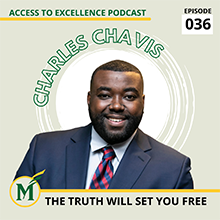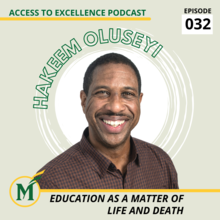A podcast All Together Different
Join George Mason University President Gregory Washington as he invites experts, change-makers, innovators, and thought leaders to engage in meaningful conversations about the greatest challenges of our time.
Listen and learn from audacious people from George Mason and beyond who represent the diversity of insight, the agility of collaboration, and the tenacity required in the struggle for a better future that is at the essence of the Mason Nation.

President Gregory Washington hosts each episode of the Access to Excellence podcast, recorded on the campus of George Mason University.

On this episode of Access to Excellence, President Gregory Washington is joined by Rick Davis, dean of the College of Visual and Performing Arts, to discuss the history of the arts at George Mason and the critical role the arts play in creating and maintaining community.

Rick Davis is the dean of the College of Visual and Performing Arts at George Mason and executive director of the Hylton Performing Arts Center.
Subscribe on Your Preferred Platform
All Episodes
- October 18, 2022Are the midterm elections the most consequential of our time? Maybe, maybe not. Jennifer Victor, associate professor of political science in Mason’s Schar School of Policy and Government and Mason president Gregory Washington wrestle with that, and you might be surprised at the answer. Want more surprises? Then hear why high voter turnout could be a double-edged sword for our democracy.
- September 6, 2022Dr. Michael Nickens, an associate professor of music at Mason, explains how he transforms from his mild-mannered persona into Doc Nix, the flamboyant leader of the Green Machine, the nation’s No. 1 pep band. Actor Bill Murray is a fan of the band, and Nix is pretty good on the tuba.
- July 25, 2022Alpaslan Özerdem, dean of the Jimmy and Rosalynn Carter School for Peace and Conflict Resolution explains the keys to effective peacebuilding, whether it concerns the war in Ukraine, gun violence or local issues. And don’t miss the discussions about how an alien invasion could help mend the rift between Russia and the West.
- June 15, 2022Rep. Cori Bush, Missouri's first Black congresswoman, is teaching at Mason this summer. A pastor, teacher, nurse, and anr activist in Ferguson, Mo., Bush talks about her most her unusual, and activist, path to Congress. “There is always someone to help, something to give,” she says. And she doesn’t flinch discussing controversial issue around race and policing.
- May 20, 2022Louise Shelley, a University Professor and director of Mason’s Terrorism, Transnational Crime and Corruption Center, explains the connections between Russia’s war in Ukraine and corruption and organized crime, and how criminals and terrorists take advantage of the globalized world in which we live.
- April 19, 2022Jim Trefil, a Mason physicist and Robinson Professor, explains the importance of a scientific worldview. The author of more than 50 books and one of the developers of the modern theories about quarks as a fundamental component of the universe, Trefil is helping pioneer a new way of teaching science.
- March 15, 2022Larry Pfeiffer, director of Mason’s Michael V. Hayden Center for Intelligence, Policy, and International Security explains Vladimir Putin’s real agenda in Ukraine and why China is taking notes. He also asks Americans to guard against autocracy at home because, as he said, it doesn’t take much for a country's values to be subverted and freedoms suppressed.
- February 18, 2022Charles Chavis, an assistant professor of conflict resolution and history, and director of African and African American studies, talks about his new book that explores the lynching of a young Black man in Salisbury, Md, and how understanding his story and the Black experience can help find the right ways to fight anti-Black violence today.
- January 12, 2022Ted Dumas, an associate professor of psychology and an experienced researcher, reveals foods we are losing to climate change, how a pooping bear in Japan can help keep cherries from extinction, and that if we do nothing about the climate, most of the US could be uninhabitable by 2100.
- December 8, 2021Thalia Goldstein, associate professor of applied developmental psychology explains how kids benefit socially and emotionally from finding out Santa Claus isn’t real. Even so, Goldstein admits she is still disappointed about hearing the truth. A conversation with real holiday spirit.
- November 19, 2021John G. Turner explains the real history of Thanksgiving. Were the Pilgrims religious refugees who established democracy and the holiday in New England, or invaders who betrayed their native allies and even enslaved them? A fascinating story with lots to digest.
- November 10, 2021Hakeem Oluseyi explains how he went from a life of crime to being one of the world’s renowned astrophysicists. He describes what aliens might look like – think a two-foot tall Incredible Hulk – and how the pull of the classroom overcame the pull of the streets.














